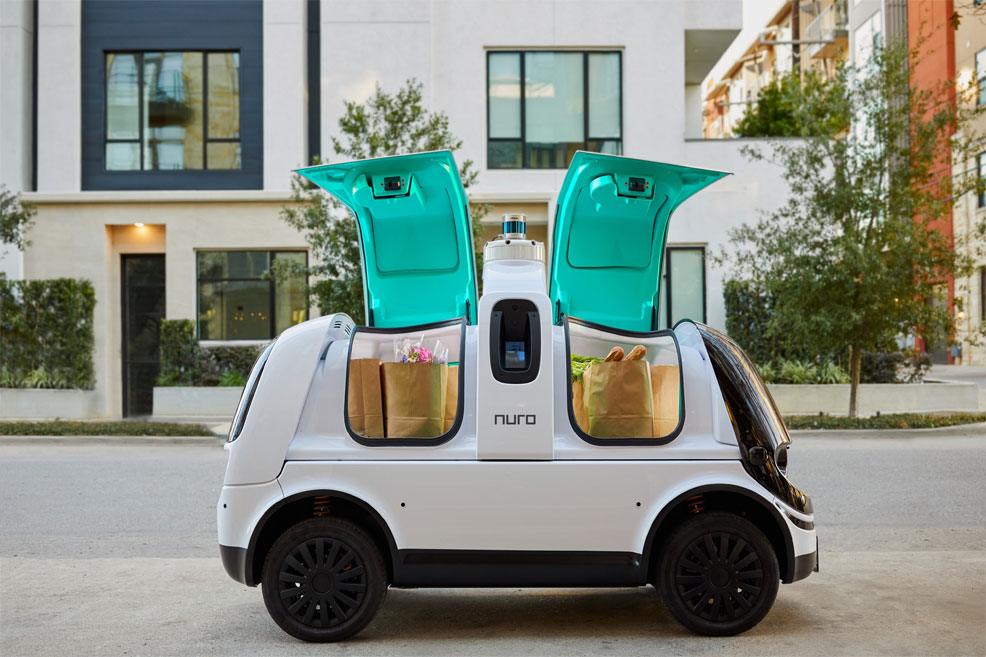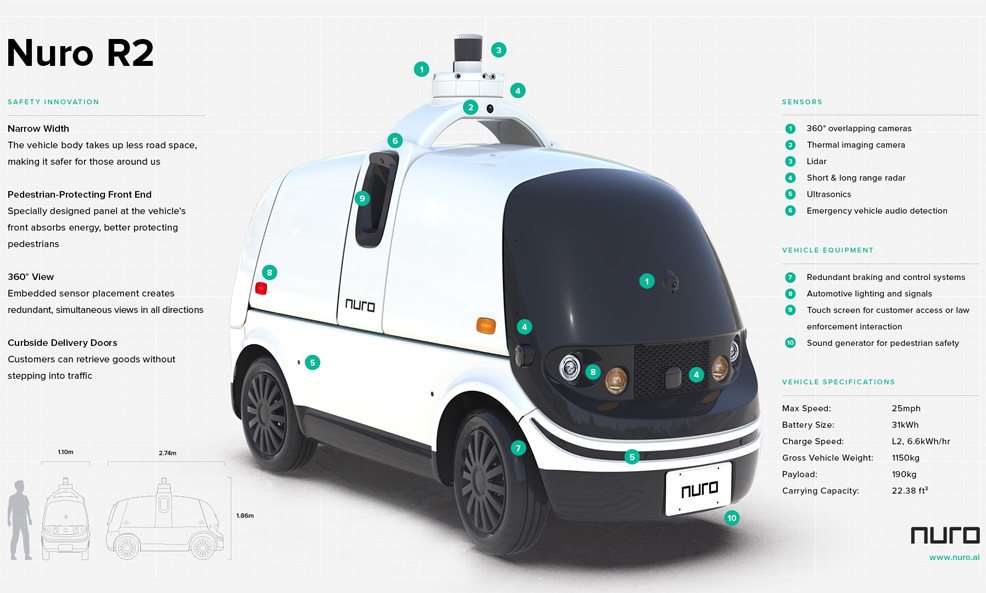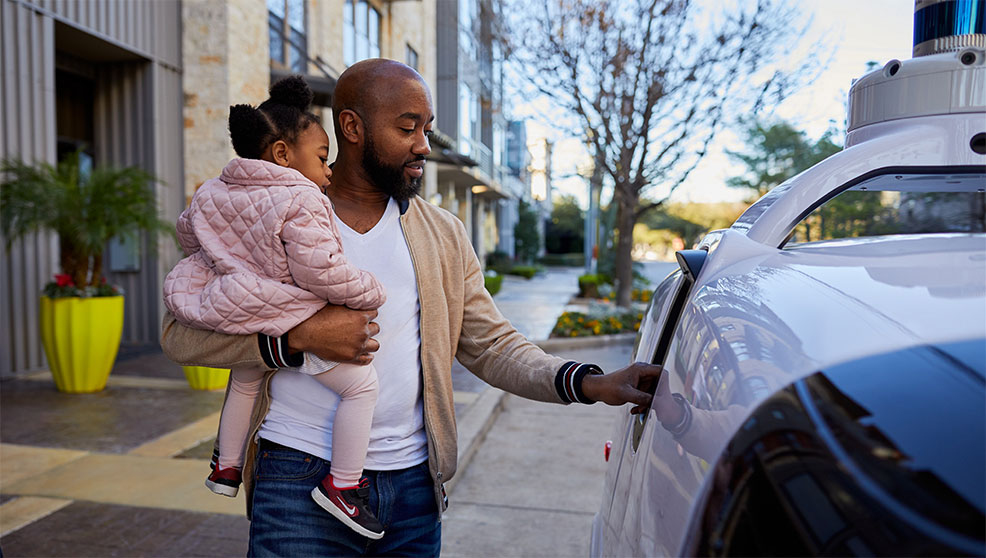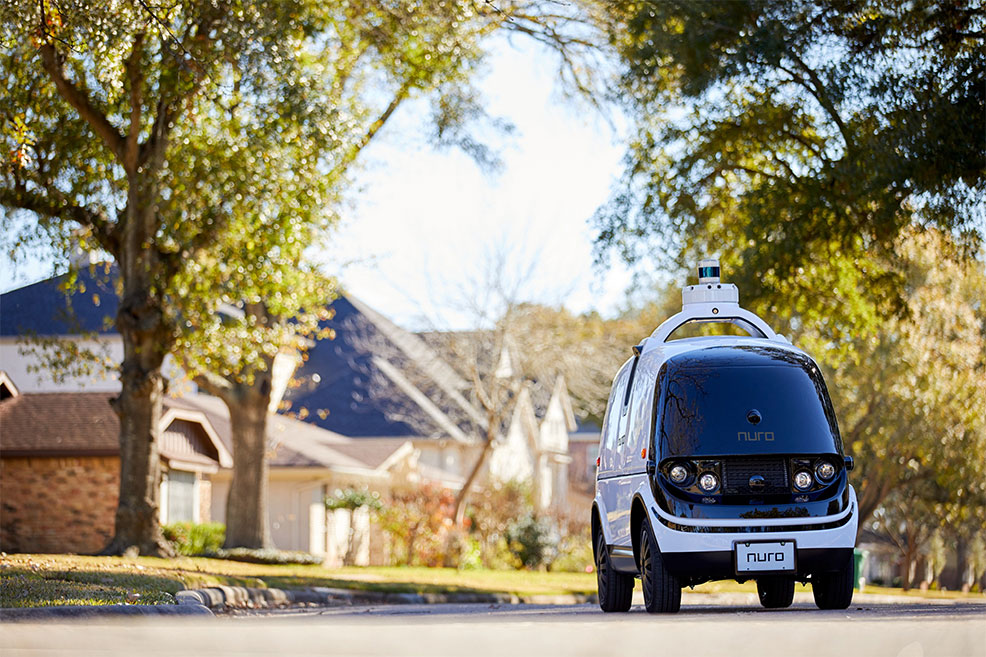
11th February 2020 5,000 self-driving delivery vehicles approved by U.S. regulators The U.S. National Highway Traffic Safety Administration (NHTSA) has given permission for Nuro Inc. to deploy up to 5,000 self-driving delivery vehicles across the country. The company has revealed its second-generation vehicle, the R2, which is granted regulatory exemption.
Almost exactly a year ago, we reported on Nuro – a robotics and AI company based in California – and its efforts to expand self-driving delivery vehicles across the United States. Nuro had recently launched the first unmanned delivery service for the general public in Arizona. Its "R1" robot was able to store and carry a variety of goods – ranging from supermarket groceries to takeaway dinners, and dry cleaning – with journeys on the road completed autonomously and via electric vehicle technology. Since then, Nuro has made further developments – forming partnerships with Domino's, the world’s largest pizza company, as well as retail giant Walmart in Houston, Texas. Thousands of customer deliveries are reported to have been made as the company tests and refines its technology. Nuro has additionally worked on a second-generation vehicle, the R2. The National Highway Traffic Safety Administration (NHTSA), which is part of the Department of Transportation (DOT), last week approved the R2 and granted the vehicle a regulatory exemption. This was the first time the agency has ever approved the deployment of an automated driving system without meeting all national auto safety standards. "With our second-generation vehicle, R2, we wanted to retain our unique design and the key characteristics – including zero-emission propulsion and a magical customer experience – that made R1 a success," explains co-founder, Dave Ferguson, in a blog post. "We also wanted to extend the vehicle's lifespan, add more cargo space, and handle more varied conditions at a greater, city-wide scale."
With R2, Nuro has improved upon existing safety features already present in the R1 vehicle, while introducing a number of brand-new features, including: • Standardised Production: R2 was designed and assembled in the U.S. in partnership with Roush Enterprises, a Michigan-based full-service product development supplier. R2 has a more durable custom vehicle body, equipped to handle a greater variety of roads, climates, and weather conditions. • Narrow Vehicle Profile: With the NHTSA exemption, R2 does not require side mirrors typically relied upon by a human driver. This vehicle has smooth rounded contours where side mirrors otherwise would be placed, making it narrower and creating additional room for bicyclists and other vulnerable road users. • 360° Vision: The NHTSA's regulatory exemption permits R2 to continue operating its rear-view cameras while moving forward, since the vehicle will never be occupied by a human driver who could otherwise become distracted by the rear video display. R2's ability to see a complete 360° view of the roads at all times is therefore preserved using lidar, radar, and cameras without any blind spots. • Pedestrian-Protecting Front End: With the NHTSA exemption, R2 does not require a traditional, rigid windshield structure designed for driver visibility and protection of passengers. R2 features a pedestrian-protecting front end that absorbs energy and can collapse inward to better protect those outside of the vehicle. • Larger, Climate-Controlled Compartments: R2 features 65% larger capacity and compartments with temperature control to keep perishable goods fresh, including groceries or meals. Climate-controlled compartments expand the type and quantity of goods R2 can deliver, without increasing vehicle width. • Improved Customer Experience: R2 will be easier to interact with than ever before. The vehicle has redesigned doors to provide more headroom and clearer access to the compartments. It also has a larger exterior screen for unlocking compartments and interacting with the vehicle.
The NHTSA's decision to grant Nuro's R2 a regulatory exemption comes after three years of discussion and collaboration with the agency. After extensive preliminary discussions, Nuro submitted the request in October 2018. The NHTSA then requested comments from the public in March 2019. During that period, many stakeholders wrote in support of the exemption including the Mayor and Chief of Police of Scottsdale (where Nuro operated a delivery service from December 2018 to March 2019 and continues testing operations), Kroger (a delivery partner), as well as other automakers, self-driving technology companies, clean-energy advocates, and fellow citizens. "We founded Nuro on the belief that we could reimagine, design, and develop an autonomous vehicle that would make the world a safer place," adds Ferguson. "Our second-generation vehicle will advance our goal of transforming local commerce, and we are gratified that the DOT, under Secretary Chao's leadership, is promoting public safety and providing regulatory certainty for the self-driving industry. "Today's decision shows that ‘exemption’ can mean more safety. Our world-class team solved countless novel problems to create this design, and, after extensive modelling, research, and testing, created a vehicle unlike any other on the road today." The R2 will soon join Nuro's fleet of self-driving Prius vehicles in Houston, TX, making deliveries to consumers on public roads. The DOT's approval enables up to 5,000 of these low-speed, autonomous, electric delivery vehicles to operate over the next two years – representing a larger scale effort by Nuro to transform local commerce and provide an affordable, accessible delivery service to communities across the country. By replacing heavy passenger vehicles utilised for shopping and other errands, Nuro hopes to promote a new era of neighbourhood-friendly, socially responsible, hi-tech vehicles. To enable the safe and responsible growth of the autonomous delivery industry, Nuro is supporting the DOT’s efforts to modernise their underlying regulations, which were written before Nuro developed the first vehicles without any occupants. The DOT has already begun the process, and recently announced that it intends to begin rulemaking on passengerless vehicles this year. Globally, the autonomous last mile delivery market is forecast to grow from $12 billion in 2019 to $92 billion by 2030, at a Compound Annual Growth Rate (CAGR) of 20.3%. So you are very likely to witness AI-driven vehicles moving on the roads in the near future, and one of them just might be an R2.
Comments »
If you enjoyed this article, please consider sharing it:
|










